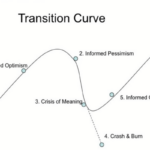Why Small Problems Lead to Bigger Ones
Have you ever walked into a neighborhood with shattered windows, graffiti-covered walls, and litter everywhere? Chances are, you probably didn’t feel safe. You might have even assumed the place had a high crime rate. But why does something as small as a broken window make us feel that way?
This idea is at the heart of the Broken Window Theory. It suggests that when small signs of disorder—like broken windows, vandalism, or litter—are ignored, they create an environment where bigger problems, like crime and social decay, can thrive.
How It All Started
In 1982, criminologists James Q. Wilson and George Kelling introduced the Broken Window Theory. Their research showed that when minor crimes or acts of neglect go unchecked, they signal that no one is in control. Over time, this leads to more significant issues—what starts as graffiti on a wall can escalate into serious criminal activity.
To prove this, researchers ran a social experiment:
- They left a car in a quiet neighborhood with no visible damage. For days, no one touched it.
- Then, they smashed one of its windows and left it there. Within hours, people vandalized it completely.
The message? Once people see disorder, they assume no one cares—and that’s when things spiral.
How This Applies Beyond Crime
The Broken Window Theory isn’t just about crime and neighborhoods—it applies to many areas of life.
1. In Business and Workplaces
When small inefficiencies, unprofessional behavior, or lack of accountability are ignored in a company, they spread. If employees see that missed deadlines, toxic culture, or poor work ethic go unchallenged, they start adopting the same behavior. Soon, productivity and morale drop.
2. In Personal Habits
Ever noticed how skipping one workout can turn into skipping a whole week? Or how leaving one dish in the sink can lead to a messy kitchen? Small acts of neglect build up over time, shaping the environment we live in and the habits we form.
3. In Relationships
Ignoring small problems in friendships or relationships—like lack of communication or unresolved conflicts—can slowly erode trust. When left unchecked, what seemed like a minor issue can grow into an unfixable problem.
Fix the Small Problems Before They Grow
The key lesson from the Broken Window Theory is this: address small issues early.
- If you see litter in your community, pick it up.
- If you notice bad habits creeping into your routine, correct them.
- If there’s a toxic pattern in your workplace, speak up before it worsens.
Small actions send a message—to yourself and to others—that order, discipline, and care matter.
So, what’s your “broken window” today? What’s that one small issue in your life that, if left unchecked, could grow into something bigger? Maybe it’s time to fix it.
Learning never stops.
Take a moment to reflect and act on what resonates with you.
Keep evolving.
– MJ Nyota



